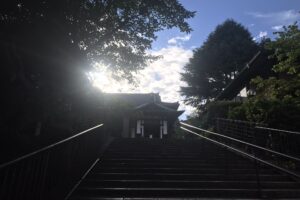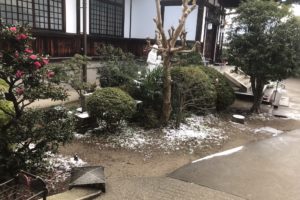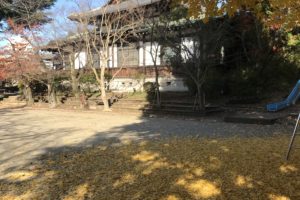The 22nd Sunday after Pentecost ( Proper 27 )
Luke 20:28-38
Rev. Misa Furumoto
November 1 was All Saints’ Day. Our church held a memorial service for the deceased on last Sunday, October 30th, and many people went to the church cemetery to offer prayers the day before.
Death is something that none of us living in this world can avoid. We don’t want to talk about it; we want to look away from it as much as possible. Because it’s frightening. What happens when we die? Where will we go? Are there a heaven and a hell? Are we really meeting again our loved ones who have gone before us? None of these are certain. We fear what we cannot see, what we have not experienced, and what we cannot understand with our minds. So, we try our best. In order to see what a baby is like in a mother’s womb, we developed the technology of ultrasound. Parents are happy to see that picture and get relieved by knowing that the baby is doing fine. Nowadays, more and more people are getting prenatal diagnoses to check whether the baby has a congenital disease and abnormality. And unfortunately, an increasing number of people are choosing not to have a baby once the abnormality is discovered. As you know, this has become a major bioethical debate. And not only about unborn children. It is now also possible to find out if you are likely to develop cancer in the future by checking your genes.
The development of science in human history has been tremendous. In the past, it would have been unimaginable for people to be able to see inside the body, which is covered with flesh. We have been pursuing, studying, and discovering what we do not know, such as what is at the bottom of the ocean, what is happening at the center of the earth, and how far the universe extends. We are afraid of not being able to see or understand. We somehow think that if we can see and understand something logically, we would be able to deal with the problems ourselves. In the process, we forget God and come to believe that this world belongs to us, that our lives belong to us, and that we can handle them on our own.
But no matter how much science advances, there is one part of our lives that we cannot reach: the answer to the question of where we came from and where we are going. What happens to us when we die? This question has remained the same from the beginning of human history to the present.
In today’s Gospel, the Sadducees pose this question to Jesus. In Luke’s Gospel, the Sadducees are only mentioned here, so it is difficult to understand what kind of people they were, but they seem to have been the priestly, conservative, and aristocratic class who served in the Jerusalem Temple. Apart from them, the Pharisees and the scribes appear frequently in the Gospels. They are often criticized by Jesus for being so concerned about the Jewish rules called the Law that they lose sight of what is most important, to love.
The Sadducees, like the Pharisees, also valued the Law, but they absolutized only the Five Books of Moses, called Torah (Genesis, Exodus, Leviticus, Numbers, and Deuteronomy), which were believed to have been written by Moses. They largely ignored the later writings of the prophets. From about the third century B.C. onward, in later prophetic books, such as Isaiah and Daniel, a kind of apocalyptic literature began to appear, and beliefs about the resurrection of the dead began to emerge. The Pharisees believed in and inherited that idea of resurrection, but the Sadducees did not recognize it because Moses did not say anything about resurrection.
The Pharisees and Sadducees always quarreled over whether or not there was a resurrection of the dead. However, there was now a factor that brought them together. They were both in their desire to bring down Jesus, a man who did not follow the Law as they had been told and who could only be seen as blasphemous.
If you look throughout the Gospels, you will see that the Pharisees and the scribes were always following Jesus and questioning his teachings and deeds, but this time, the Sadducees come out. They came to him and said, “Teacher, we have a question! In the Law of Moses, there is a rule that if a man is married and dies before his children are born, his widowed wife must remarry his brother and have an heir for her dead husband, right? If there really is a resurrection, what happens in the following case? A family has seven sons. The oldest son marries a woman, but he dies before they have children. The wife remarried his brother, the second son, as was the rule, but he too died before having children. The woman continued to remarry with the third, fourth, fifth, sixth, and seventh sons, but in the end all of them died childless. Finally, the woman also died. Then, when she is resurrected, whose wife will she be?
It is such a hilarious question, and we never think that such a thing would ever happen. It is also quite disturbing that women are seen here as nothing more than child-bearing machines. Although it is not clearly written in the Bible, it seems that people thought that when the end of the world came, all the dead would come out of their graves at once and live the same kind of life again in physical bodies. The Sadducees didn’t believe this, but this was the general understanding of the resurrection in Jesus’ day.
Jesus answered this stupid question. First, he said that those who were deemed worthy by God to be resurrected would not marry as they did in the world. In those days, marriage was not for the happiness of the person, but rather to leave an heir. If you are resurrected, there is no need to do so. After all, they would no longer die. They will be equal to angels. That would mean that they are spiritual beings without bodies. And they will be the children of God and live forever.
Next, Jesus explained that God is the God of the living by citing what Moses said, whom the Sadducees respected the most. At Mount Sinai, Moses saw a burning bush. If it were really burning, it would have burned up and turned to ashes, but it kept burning. The bush perhaps showed the eternity of God. Moses there heard the voice of the Lord and called Him the God of Abraham, the God of Isaac, and the God of Jacob. With the ever-burning bush, God showed that He continues to live as the God of the faithful from Abraham to the present, and that in Him, or with Him, those who have left this world also live.
And finally, he says. “For to him all of them are alive.” It is only after Jesus came to this world as the Word of God that we are able to live to God. Jesus’ crucifixion and resurrection have bridged the great gap between God and all of humanity.
In three weeks we will enter the Advent. Advent is a time to reflect on whether we are living to God and whether we are ready to receive Jesus into our hearts. What does it mean to live to God? I believe it means to entrust everything to God. We are anxious about the future we have yet to see. What if I fail the entrance exam? What if my baby is sick? What if I get cancer? What if I die? There is no need to worry about anything. All you need is to believe in the Lord Jesus Christ who made it possible for you to live to God.














